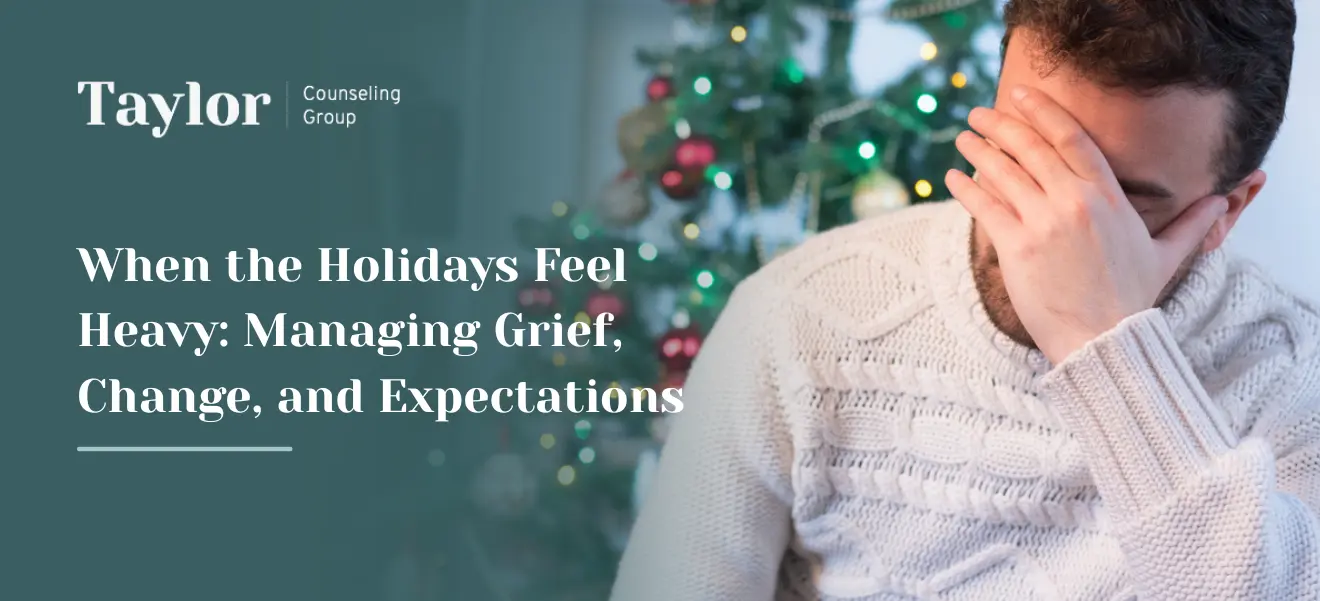The holidays are often portrayed as a season of joy, togetherness, and celebration. Yet for many people, this time of year brings something quite different: heaviness, grief, and emotional overwhelm. If you’re struggling during the holidays—whether you’re grieving a loss, navigating a major life change, or wrestling with unrealistic expectations—you’re not alone.
The holiday season has a unique way of amplifying our most profound emotions. For those experiencing grief, the empty chairs at family gatherings and familiar traditions tied to loved ones can be exceptionally painful.
Adding the cultural messaging about “perfect” holidays can make this time feel particularly isolating and painful. Similarly, if you’re going through a significant life transition—a divorce, job loss, relocation, or health challenge—the holidays can feel like an unwelcome spotlight on everything that’s different this year.
At Taylor Counseling Group, we support individuals throughout Texas at our 10 convenient locations across Dallas/Fort Worth, San Antonio, Houston, Austin, and Waco. With more than 58 licensed counselors specializing in grief recovery, life transitions, and stress management, our team offers tailored guidance to help you manage emotional challenges, especially during the holidays. We strive to make therapy accessible, accepting major insurance plans including Aetna, Cigna, United, Molina, Blue Cross Blue Shield, Medicare, Tristar, and more. For a comprehensive list of insurances we accept, please click here. Whether you need in-person or online sessions, appointments are typically available within 48 hours—so you don’t have to wait for support when you need it most.
Understanding Holiday Grief and Loss
 Grief doesn’t follow a calendar. Yet the holidays have a way of intensifying it, even years after a loss. According to the American Psychological Association, grief during holidays is a common experience that affects millions of people annually. Research from the National Institute of Mental Health confirms that seasonal grief intensification is a recognized psychological phenomenon.
Grief doesn’t follow a calendar. Yet the holidays have a way of intensifying it, even years after a loss. According to the American Psychological Association, grief during holidays is a common experience that affects millions of people annually. Research from the National Institute of Mental Health confirms that seasonal grief intensification is a recognized psychological phenomenon.
Why the Holiday Season Amplifies Grief
Several factors make holiday grief particularly acute:
Traditions tied to the absent loved one. Whether it’s your mother’s famous recipe, your father’s way of decorating, or a special outing you always did together, holiday traditions are deeply personal. When someone is missing, these traditions become painful reminders of loss. Our grief recovery counselors help clients navigate these emotional triggers.
Increased family gatherings and social expectations. The holidays bring family together, which can feel wonderful—or overwhelming. If you’re grieving, being surrounded by people celebrating while you’re hurting can intensify feelings of isolation and sadness. This is where anxiety counseling can provide valuable support.
Media and cultural messaging about “perfect” holidays. Everywhere we look during the holiday season, we see images of perfect families, perfect celebrations, and perfect joy. This cultural narrative can make your grief feel out of place, as if you’re doing the holidays “wrong” by not feeling happy.
Seasonal reminders and nostalgia. The sights, sounds, and smells of the season—holiday music, decorations, seasonal foods—can trigger memories and bring grief to the surface unexpectedly. Understanding these triggers is a key part of grief & loss recovery.
The truth is, grief during the holidays is a normal and valid experience. Many people find that their grief resurfaces or intensifies during this season, even if they’ve been managing it well throughout the year. This doesn’t mean you’re not healing; it means you’re human, and you’re honoring the significance of your loss.
Navigating Major Life Changes During the Holidays
If you’re experiencing a major life transition, the holidays can feel like adding insult to injury. A divorce, job loss, relocation, health diagnosis, or other significant change is difficult enough on its own. But when that change coincides with the holiday season, the emotional weight can feel unbearable. The American Psychological Association notes that major life transitions during high-stress periods, such as the holidays, can exacerbate emotional challenges.
The Compounding Effect
The challenge isn’t just the life change itself—it’s the collision between that change and holiday expectations. You’re supposed to be celebrating, but you’re grieving the loss of your old life. You’re supposed to be with family, but you’re navigating new family dynamics.
The holiday season can intensify these contrasts painfully. Whether you’re navigating your first holiday after divorce, mourning a recent job loss, or adjusting to a new location, the emotional weight feels heavier during celebrations.
An empty house replaces the bustle you once knew. Financial anxiety creeps in as you watch others shop freely for gifts. Familiar traditions and the community you left behind become painful reminders of what’s changed.
The good news? It’s perfectly okay to feel differently about the holidays after a significant life change. You don’t have to pretend everything is fine. You don’t have to force yourself into the same holiday traditions you’ve always followed. And you don’t have to do this alone.
Taylor Counseling Group specializes in helping people navigate life transitions and manage the stress that comes with major change. Our Counselors can help you process your emotions, adjust your expectations, and find meaning in this new chapter of your life.
Resetting Unrealistic Holiday Expectations
 One of the most significant sources of holiday stress isn’t the holidays themselves—it’s the expectations we place on them. We expect the holidays to be perfect, joyful, and meaningful, and expect ourselves to be cheerful hosts, thoughtful gift-givers, and present family members. We expect our families to get along, our celebrations to go smoothly, and our hearts to feel full.
One of the most significant sources of holiday stress isn’t the holidays themselves—it’s the expectations we place on them. We expect the holidays to be perfect, joyful, and meaningful, and expect ourselves to be cheerful hosts, thoughtful gift-givers, and present family members. We expect our families to get along, our celebrations to go smoothly, and our hearts to feel full.
But life rarely works that way, especially when you’re grieving or navigating change. Research from the National Alliance on Mental Illness highlights how unrealistic expectations during the holidays can significantly impact mental health.
Permission to Do Things Differently
The first step in resetting your holiday expectations is giving yourself permission to do things differently this year. This might mean:
Acknowledging what’s different. Instead of pretending everything is the same as last year, name what’s changed. This creates space for your feelings and helps you adjust your expectations accordingly.
Giving yourself permission to skip traditions. If a particular tradition feels painful this year, you don’t have to do it. You can modify it, postpone it, or skip it entirely. Your mental health matters more than maintaining tradition. This is where mental health counseling can help you navigate difficult decisions.
Focusing on meaningful moments rather than perfection. Instead of aiming for a picture-perfect holiday, focus on moments of genuine connection. A quiet conversation with a close friend might be more meaningful than a large family gathering.
Communicating boundaries with family. Let your loved ones know what you need this year. This might mean limiting the length of gatherings, avoiding certain topics, or being honest about your emotional capacity. Anxiety counseling can help you develop communication strategies.
Creating new traditions that honor your current reality. If old traditions feel too painful, create new ones. This might be volunteering, spending time in nature, engaging in a hobby you love, or simply being gentle with yourself.
For those seeking spiritual support during this time, Taylor Counseling Group offers faith-based counseling that honors your beliefs while helping you navigate grief and change.
Practical Coping Strategies for a Heavier Holiday Season
When the holidays feel heavy, having concrete strategies can make a real difference. Here are practical steps you can take right now:
Set boundaries with family and social obligations. You don’t have to say yes to every invitation or participate in every tradition. It’s okay to decline events that feel overwhelming or to leave early if you need to.
Create a self-care plan before the holidays begin. Don’t wait until you’re overwhelmed to think about self-care. Plan ahead: What activities bring you comfort? What do you need to feel grounded? How will you prioritize your mental health? Our stress management services can help you develop a personalized plan.
Acknowledge your feelings without judgment. If you’re sad, angry, or anxious, that’s okay. Don’t try to suppress these feelings or judge yourself for having them. Acknowledge them, sit with them, and let them move through you. The Substance Abuse and Mental Health Services Administration emphasizes the importance of emotional validation during stressful periods.
Reach out to supportive friends or family. You don’t have to go through this alone. Share your experiences with people you trust. Sometimes just being heard can lighten the emotional load.
Maintain healthy habits. During stressful times, it’s easy to neglect sleep, exercise, and nutrition. But these basics are more important than ever when you’re struggling. Prioritize sleep, move your body, and eat nourishing foods.
Engage in meaningful activities rather than obligatory ones. Instead of forcing yourself to participate in traditions that feel hollow, spend time doing things that feel authentic and meaningful to you.
Honor your loved one through remembrance rituals. If you’re grieving, consider creating a small ritual to honor your loved one—such as lighting a candle, writing a letter, visiting a meaningful place, or sharing memories with someone close to you. Our grief & loss recovery specialists can guide you through this process.
When to Seek Professional Support
 While the strategies above can help, there are times when professional support becomes essential. Consider reaching out to a counselor if you’re experiencing:
While the strategies above can help, there are times when professional support becomes essential. Consider reaching out to a counselor if you’re experiencing:
Overwhelming grief that interferes with daily functioning. If your grief is so intense that you can’t work, eat, sleep, or care for yourself, professional support can help. Our grief counseling services are specifically designed for this.
Isolation and withdrawal from others. If you’re pulling away from people and spending most of your time alone, this can deepen depression and anxiety.
Increased substance use or unhealthy coping mechanisms. If you’re turning to alcohol, drugs, or other unhealthy behaviors to cope, it’s time to reach out for help.
Persistent hopelessness or suicidal thoughts. If you’re having thoughts of harming yourself, please contact a mental health professional or crisis line immediately. The National Suicide Prevention Lifeline is available 24/7 at 988.
Inability to manage stress or anxiety. If stress and anxiety are taking over your life, therapy can provide tools and support to help you regain control.
Why Choose Taylor Counseling Group?
We at Taylor Counseling Group recognize that accessibility matters. That’s why we offer:
Affordable care: Our affordable care program starts at $120/hour for private pay clients, making therapy accessible to more people.
Quick scheduling: We can typically schedule appointments within 48 hours, so you don’t have to wait when you need support.
Online therapy: If you prefer to meet from home, our online therapy services are available.
Multiple locations: With offices in Dallas/Fort Worth, Houston, San Antonio, Austin, and Waco, we’re here for Central Texas.
Insurance accepted: We work with major insurance plans, including Aetna, Cigna Behavioral Health, Blue Cross Blue Shield, United/Optum, and more.
Our counselors specialize in grief & loss recovery, anxiety, depression, stress management, life transitions, and faith-based counseling. Whether you’re grieving a loss, navigating change, or struggling with holiday stress, we’re here to help.
Moving Forward with Compassion
The holidays don’t have to be perfect to be meaningful. They don’t have to look like they did last year. And you don’t have to face them alone.
If this holiday season feels heavy, that’s valid. Your grief is real. Your struggles with change are real, and help is available.
Contact Taylor Counseling Group today. Our compassionate counselors are ready to support you through this season and beyond.
You deserve support, compassion, and care—especially during the holidays. Let us help you navigate this season with greater peace and resilience.
Frequently Asked Questions
Is it normal to feel sad or depressed during the holidays?
Yes, absolutely. It’s completely normal to experience sadness, depression, or emotional heaviness during the holidays. In fact, many people find that their mood shifts during this season, especially if they’re grieving a loss or navigating a major life change. The holidays can intensify emotions because they’re often tied to memories, traditions, and expectations.
If you’ve lost a loved one, the holidays may bring back memories of their absence. If you’re going through a divorce or other life transition, the holidays can highlight what’s different this year. These feelings are valid and understandable. However, if your sadness is persistent, interferes with daily functioning, or includes thoughts of harming yourself, it’s important to reach out to a mental health professional. Taylor Counseling Group’s depression counseling services can help you navigate these feelings and develop healthier coping strategies.
How can I honor a loved one during the holidays while I’m grieving?
Honoring a loved one during the holidays can be a meaningful way to process your grief and keep their memory alive. Consider creating a remembrance ritual by lighting a candle in their honor, writing them a letter, or setting aside time to share memories with family or close friends. You can modify traditions if a particular one feels too painful, donate or volunteer in their memory, or display photos or mementos in a memorial space.
You can cook their favorite meal, or plant a tree or flowers in their memory. The key is choosing something that feels authentic and meaningful to you. There’s no “right” way to grieve during the holidays—what matters is that it honors your loved one and your relationship with them. Taylor Counseling Group’s grief & loss recovery counselors can help you develop personalized ways to honor your loved one while managing your grief.
What should I do if holiday gatherings feel overwhelming?
If holiday gatherings feel overwhelming, you have options. You don’t have to attend every event or stay for the entire time. Set boundaries in advance by clearly communicating to family members what you can and can’t do. Plan an exit strategy and decide in advance how long you’ll stay. Take breaks by stepping outside or finding a quiet room. Bring a support person if possible. Limit difficult conversations and have a self-care plan for after the gathering
If traditional family gatherings feel too painful, consider spending the holidays differently—with close friends, volunteering, or doing something meaningful to you. Remember, your mental health and well-being are more important than maintaining traditions or meeting others’ expectations. It’s okay to do things differently this year. If you’re struggling with anxiety or stress related to holiday gatherings, Taylor Counseling Group offers anxiety counseling and stress management services to help you develop coping strategies.
Can therapy really help with holiday grief and stress?
Yes, therapy can be very helpful for managing holiday grief and stress. A trained counselor can help you process your emotions, develop coping strategies, adjust expectations, navigate life transitions, prevent isolation, and address underlying issues like depression, anxiety, or trauma. Therapy isn’t a sign of weakness—it’s a sign of strength and self-awareness. Many people find that even a few sessions during the holiday season can make a significant difference in their experience of this time of year. Taylor Counseling Group offers individual counseling, online therapy, and quick appointment scheduling (typically within 48 hours) to make therapy accessible when you need it most. Our affordable care program also makes counseling more affordable for those without insurance.
How do I know if I need professional help for holiday stress or grief?
Consider reaching out to a mental health professional if you’re experiencing:
- Overwhelming grief or sadness that interferes with your ability to work, eat, sleep, or care for yourself;
- Persistent hopelessness or thoughts of harming yourself; isolation and withdrawal from friends and family;
- Increased substance use or reliance on alcohol or drugs to cope; inability to manage anxiety or stress;
- Difficulty functioning in daily activities;
- Unresolved grief from a past loss that’s being triggered by the holidays.
It’s also okay to reach out for support even if you’re not experiencing a crisis. Many people benefit from therapy during the holidays simply to have support and guidance as they navigate this challenging season.
Taylor Counseling Group has over 70 licensed professionals across Central Texas, ready to help. We offer individual counseling tailored to your specific needs, quick appointment scheduling (typically within 48 hours), online therapy for convenience, and an affordable care program. We accept many major insurance providers, including Aetna, Blue Cross Blue Shield, Cigna, and others. Visit our insurance and payment details page to see if we accept your insurance.
We have multiple locations in Dallas/Fort Worth, Houston, San Antonio, Austin, and Waco. You don’t have to wait until you’re in crisis to reach out. Support is available and accessible.






